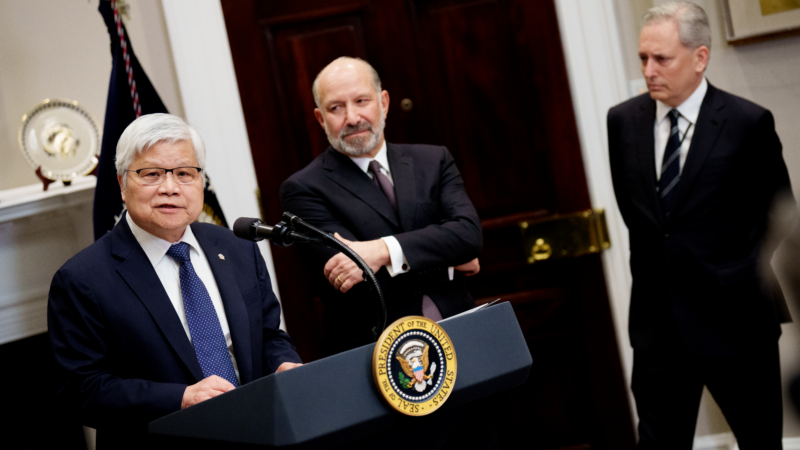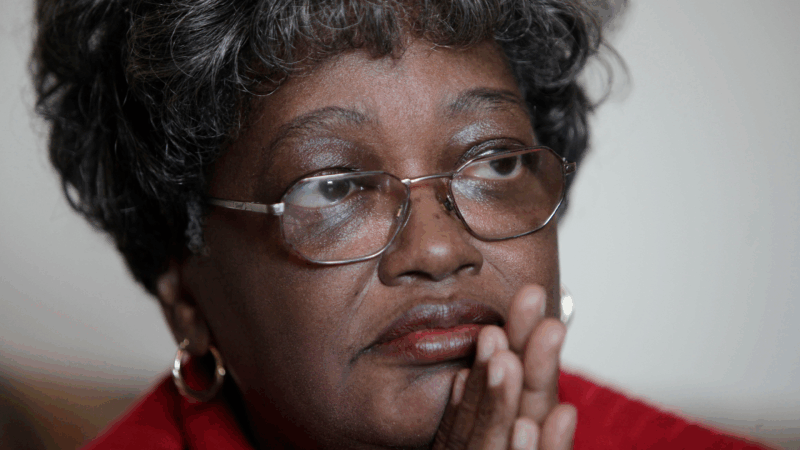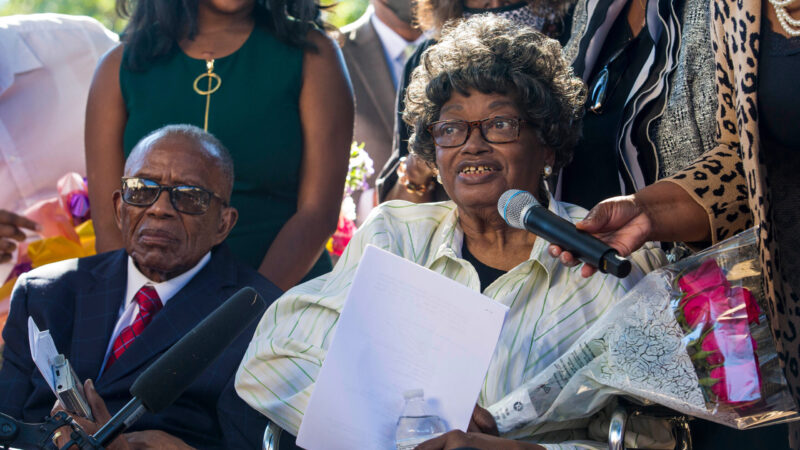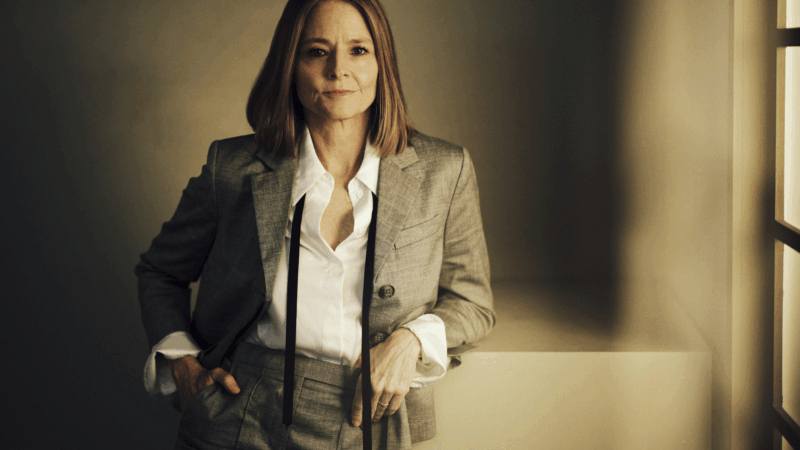Taiwanese chip giant’s investments in U.S. stir ‘silicon shield’ security worries
TAIPEI, Taiwan — President Trump’s plan for Taiwan’s leading semiconductor company to invest $100 billion into new semiconductor facilities in Arizona has divided politics here in Taiwan. Opposition politicians worry it could damage the “silicon shield” that many believe helps keep Taiwan safe from a Chinese attack.
Opposition Kuomintang (KMT) lawmaker and chief whip Fu Kun-chi, the day after the deal was announced, asked “If TSMC turns into ‘American Semiconductor Manufacturing Company’, where will Taiwan’s security be then?”
In a Facebook post, former President Ma Ying-jeou, also of the KMT, accused Taiwan’s current President Lai Ching-te of “selling” TSMC to Trump, calling it a “major national security crisis.”
Taiwan’s “silicon shield”
The “silicon shield” is a metaphor for how Taiwan’s role as a key global supplier of high-tech goods may help ensure its own geopolitical safety. The Chinese and the American economies rely heavily on imports of advanced semiconductors from Taiwan.
Indeed, Taiwan produces 60 percent of the world’s semiconductors. Therefore, both nations have some stake in avoiding a conflict that could endanger the flow of vital chips.
Both leaders worried publicly that TSMC – and Taiwan’s government, which owns the largest stake in the company – could end up gambling away that advantage.
Two days after announcing last week of the investments while standing alongside Trump, TSMC’s CEO CC Wei flew back to Taipei to host a press conference alongside Taiwan’s President, Lai Ching-te, emphasizing that the company’s most advanced semiconductor technologies would remain in Taiwan.
Are these answers enough?
For many in Taiwan’s opposition parties, which hold a combined majority in the legislature, the explanations don’t add up.

“We understand this type of negotiation takes place behind closed doors, but now that it’s over, we request our government to reveal the whole process that led up to TSMC making the announcement with President Trump,” opposition KMT lawmaker Ko Ju-chun says.
A more transparent framework for explaining these negotiations is crucial, he says, to avoid damage to Taiwan’s “silicon shield” in the future.
Between investments and tariffs: the carrot and the stick
Although Trump’s negotiating style is more aggressive, he’s not the first American president to want to make more semiconductors on U.S. soil.
Semiconductor expert Darson Chiu, the director-general of the Confederation of Asia-Pacific Chambers of Commerce and Industry, observes both former President Biden and Trump “want to make sure that the semiconductor supply chain will be consolidated and will not have to deal with external threats, such as from mainland China.”
Onshoring would help the U.S. cut its reliance on Taiwan. Chiu says on the other hand, Taiwan’s priority is to make sure that its own key role in the supply chain doesn’t disappear – or American willingness to defend it may decrease.
But moving operations from Taiwan to the U.S. isn’t just a matter of funding, Chiu says.
He points out the stronger unions and worker protections in the U.S. mean that “conducting a semiconductor operation in the United States is actually much more expensive, especially if the firm in the United States wants to maintain the quality of TSMC manufacturing similar to what it had in Taiwan.”
TSMC has already run into difficulties reconciling its management style with American labor practices at its fab near Phoenix. There are no labor unions at TSMC’s operations in Taiwan, and engineers there have often reported working long hours and weekend shifts.
For now, Chiu thinks, TSMC can make its commitments to the U.S. without sacrificing its most advanced operations in Taiwan. But Chiu says whether the silicon shield will be safe in the future depends on whether Trump is satisfied or pushes for more.
“I think TSMC chairman Wei is facing a dilemma, because on one hand, he needs to meet the needs of the Trump administration. On the other hand, he needs to assure the Taiwanese people that we’ll be safe,” Chiu says.
Sung Wen-ti, a political scientist at Australian National University, says the American president is likely satisfied for now, but “Trump’s brand of foreign policy has always been about unpredictability.”
The “Silicon Shield”: a complete defense against Chinese attack?
Many analysts also caution against relying too heavily on the idea of the “silicon shield.”
“Without U.S. security guarantees or commitments, there’s no shield,” adds Jason Hsu, a former legislator from Taiwan and a senior fellow focusing on tech policy at the Hudson Institute think tank.
“TSMC by putting down 100 billion dollars is also itself an insurance policy for security,” Hsu says. “Taiwan just needs to keep pushing the boundary, by making high level chips in the U.S. for customers such as Apple and Nvidia, but still keeping the most cutting-edge generations in Taiwan. That lets you always have one more card to play.”
Claudette Colvin, who refused to move seats on a bus at start of civil rights movement, dies
Civil rights pioneer Claudette Colvin has died. She was 86. Her 1955 arrest for refusing to give up her seat on a segregated Montgomery bus helped spark the modern civil rights movement.
Claudette Colvin, who refused to move seats on a bus at start of civil rights movement, dies at 86
Colvin, at age 15, was arrested nine months before Rosa Parks gained international fame for also refusing to give up her seat on a segregated bus.
Republicans say Clintons risk contempt of Congress for not testifying on Epstein
House Republicans are seeking testimony as part of their investigation into convicted sex offender Jeffrey Epstein. The Clintons say they've already provided in writing what little they know.
FTC accuses AI search engine of ‘rampant consumer deception’
Federal officials say a company that operates hundreds of landing pages for AI answers is running an operation that has duped thousands of users, who were unable to stop costly monthly charges.
How Minnesota faith communities are resisting aggressive immigration operations
As immigration enforcement actions have ramped up in Minnesota, people of faith have been at the forefront of the response to ICE detentions and the killing of Renee Macklin Good by a federal agent.
‘My role was making movies that mattered,’ says Jodie Foster, as ‘Taxi Driver’ turns 50
Foster was just 12 years old when she starred in the 1976 film. "What luck to have been part of that, our golden age of cinema in the '70s," she says. Her latest film is Vie Privée (A Private Life).






